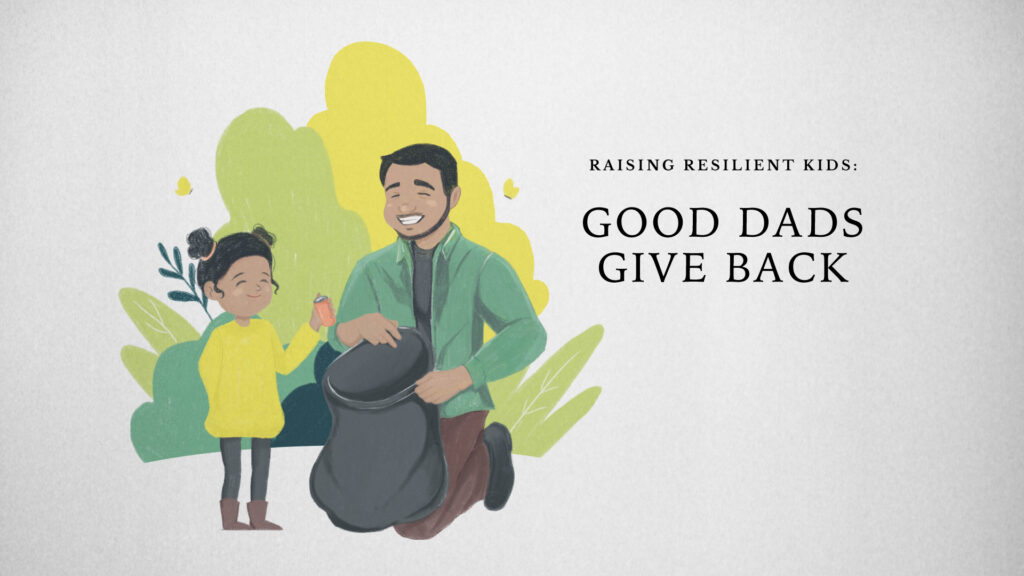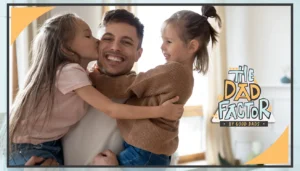What makes you happier—giving or receiving?
You probably already know what your child would say. “Getting!” You may even believe this yourself, but if you did, you would be wrong.
In one study with American men and women, 632 participants were asked to recall the last time they spent $20 or $100 on themselves or someone else. They were then given a small sum of money they could spend on themselves or someone else. What happened?
Researchers discovered that, in general, the participants felt happier when they remembered buying something for someone other than themselves. In addition, the happier participants felt about their past generosity, the more likely they were in the present to choose to spend on someone else.
Gratitude and generosity increase personal happiness.
Now, more than ever, with alarming statistics about the increase of depression among our young people, it’s even more important for good dads to model and encourage generosity in their children.
Numerous studies support the positive benefits of generosity.
Numerous studies support the positive benefits of generosity. For instance, scientists have discovered that giving boosts dopamine levels in the brain, a “feel good” neurotransmitter that helps avoid depression. In some cases, the effect is so positive that this has been dubbed the “helper’s high.”
Gratitude and generosity foster a healthy sense of interconnectedness.
The isolation of the pandemic has been very damaging to the mental health of many young people. When parents give their children opportunities to be generous, they help them create community with others, connecting with others in a meaningful way. These social connections not only increase our level of happiness, but they also make us more resilient in times of stress and crisis.

Social connections not only increase our level of happiness, but they also make us more resilient in times of stress and crisis.
According to John Helliwell, University of British Columbia, “Communities that stick together and do good for one another cope better with crises and are happier for it.”
Gratitude and generosity strengthen personal identity.
Parents who worry about their child’s self-confidence and self-esteem will be happy to know that altruism reinforces a positive view of self. It also especially helps if a child feels personally responsible in some way.
For example, in one study four to 13-year-olds were asked to donate their Halloween candy to hospitalized children. Children donated more when they felt personally responsible. These children were told, “I will be counting on you and you and I will put each of your names on the bag of candy I give tomorrow to the hospitalized children.” This worked much better than saying something like, “Please give them as much candy as you want by putting it in the box on the table.”
Gratitude and generosity inspire a sense of mission or purpose.
We all need a sense of purpose in life. Teaching young people to give inspires them by directing attention away from themselves to others. It also allows them to experience the value of helping someone else. Moreover, generosity toward another helps to create empathy, or feelings of compassion that move us away from a self-centered perspective.
We all need a sense of purpose in life. Teaching young people to give inspires them by directing attention away from themselves to others.
Don’t be afraid to expose your child to others in need. Sheltering your children from exposure to pain and suffering in life harms them much more than it hurts them. Help them see that compassion is a gift—it is a way to give their time, attention, and energy to another. When we expose kids to others’ suffering, we often find that they learn both compassion and gratitude.
How can a good dad help his child grow in generosity?
- Encourage doing one kind deed together, e.g. taking mom or grandma to lunch. Doing one kind deed makes you happier, which increases the likelihood you’ll do another.
- Praise, don’t reward, helping behavior. Avoid giving your child something for being generous, but do let her know you notice and appreciate what she is doing.
Modeling Generosity
During the months of November and December, Good Dads is helping dads teach their children more about generosity and gratitude by assisting them in finding ways to give back that fit their time, energy and development. These opportunities are varied and all involve dads doing a volunteer activity with their children.
Dads do a lot of things and make many sacrifices for the well-being of their families. We hope many dads will consider ways they can help their children enjoy the benefit of giving back to others in a meaningful way through the “Good Dads Give Back” challenge.





